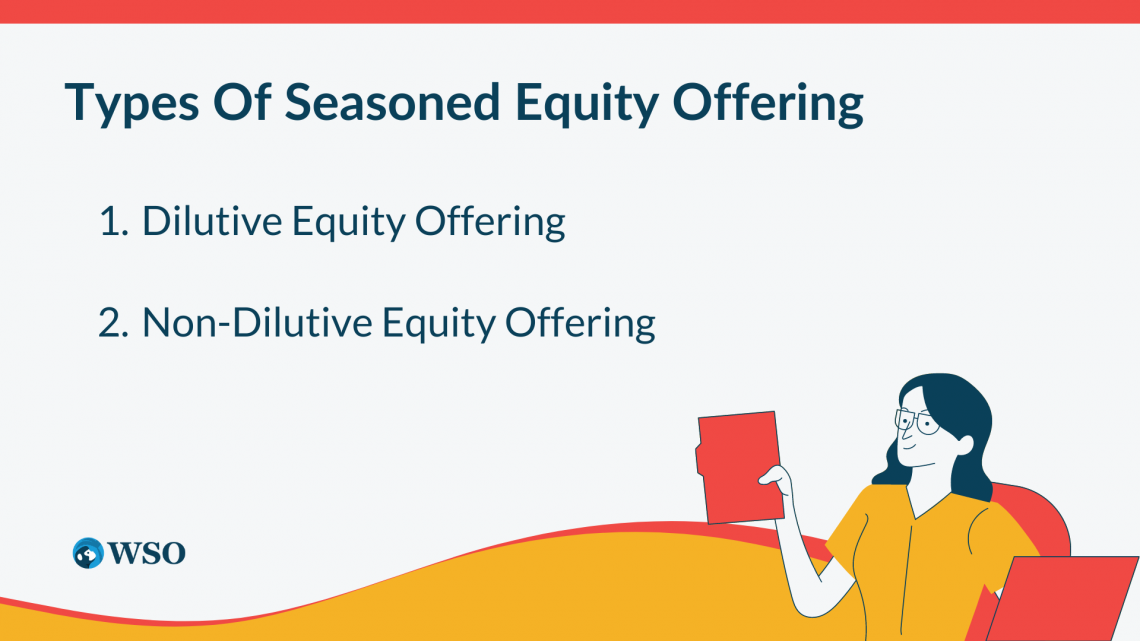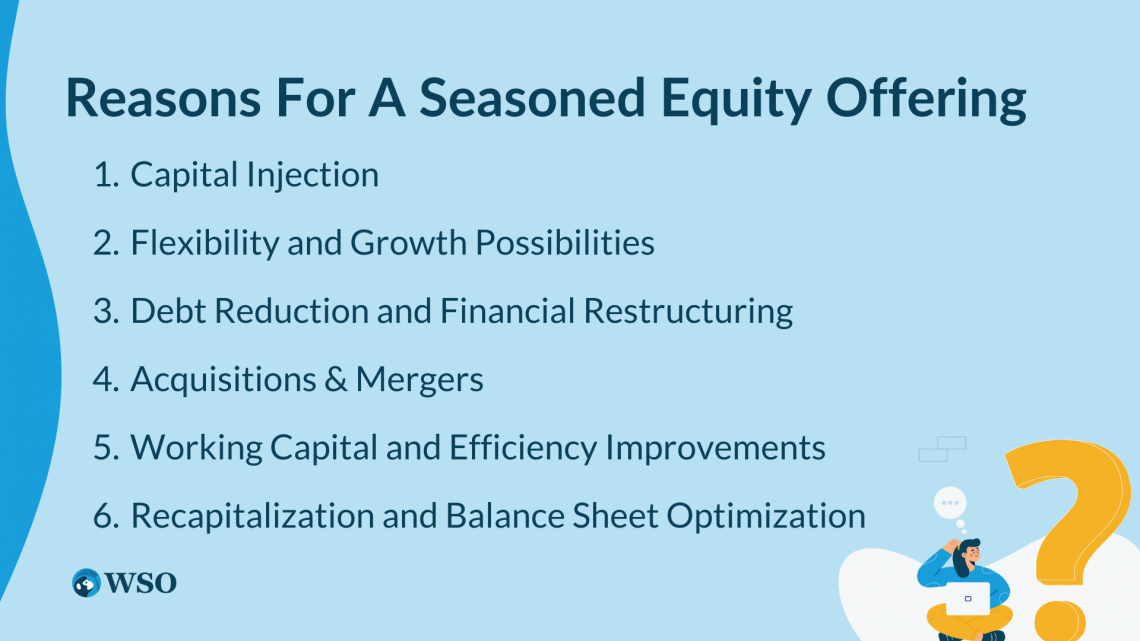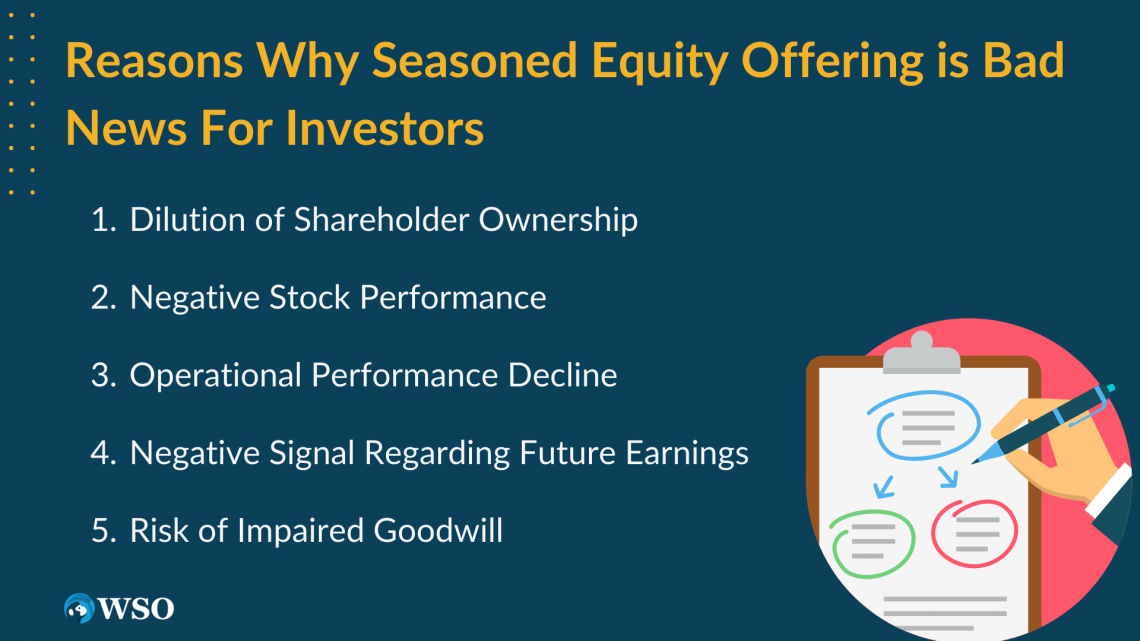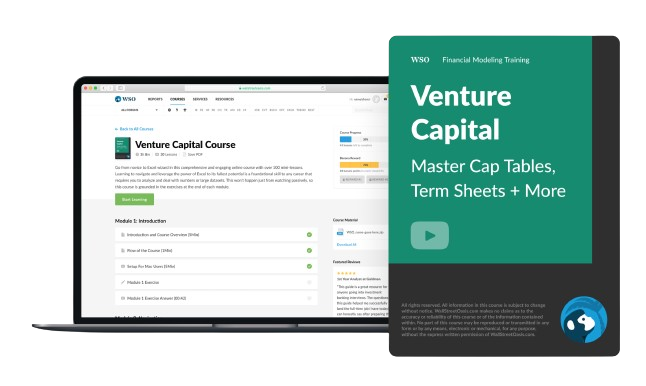Seasoned Equity Offering
A company may decide to issue additional shares through a seasoned equity offering (SEO) to raise additional funds.
A company may decide to issue additional shares through a seasoned equity offering (SEO) to raise additional funds after completing its Initial Public Offering (IPO) and becoming publicly traded.

This technique is commonly selected to assist a company's growth ambitions, such as:
- Extending infrastructure
- Purchasing other firms
- Upgrading equipment
- Funding various expansion-related efforts
Additionally, businesses may decide to use an SEO to raise money and pay down or refinance their debt during times of high-interest rates.
Alternatively, some companies may resort to SEO to secure immediate cash to settle unexpected financial difficulties.
Equity underwriters (also known as book runners) are usually investment banks that specialize in working with publicly listed firms, managing seasoned issues on behalf of the company issuing the new shares.

These underwriters determine the price of the new shares depending on the market price of the existing shares. They then notify large institutional investors about upcoming stock sales to ensure their success.
Ultimately, the funds raised from a (SEO) can be utilized to pay off debts, finance new projects, or serve other financial needs (.Market Trends 2019/20: Follow-On Offerings)
Key Takeaways
- Seasoned Equity Offerings (SEO) help companies raise additional capital after their IPO.
- SEO involve issuing new shares to the public for funding purposes.
- SEO can dilute existing shareholders' stakes but may create long-term value.
- Timing and pricing are critical for SEO success.
- Investors should research and analyze companies before investing in an SEO.
Types of Seasoned Equity Offering
It can be either dilutive or non-dilutive, depending on the nature of the offering. If the offering is to raise more funds, then it is dilutive; otherwise, it is non-dilutive.

1. Dilutive Equity Offering
A seasoned issue involves the issuance of additional shares. When new shares are issued, each existing shareholder's ownership in the business declines, lowering the value of those shares.
Dilutive shares have an impact of decreasing the share price as additional shares are issued, increasing the outstanding shares; this reduces earnings left for shareholders.
Companies may give subscription rights to existing shareholders to mitigate the effects of dilution, as shareholders can buy the additional offered shares at a discounted price.
NOTE
These rights enable shareholders to purchase shares at a reduced price before they are accessible to the public market. It gives a chance for existing shareholders to offset their dilution or to strengthen their position.
2. Non-Dilutive Equity Offering
When current shareholders sell their shares in a company, new shares are not generated, thus having no impact on shareholder ownership.
This type of seasoned issue is frequently used by founding shareholders to monetize their positions, especially when they are no longer bound by lock-up periods imposed after the company's initial public offering.
Example of Seasoned Equity Offering
On January 12, 2021, Zoom Video Communications, Inc. announced the start of an underwritten public offering of $1.5 billion in shares of its Class A common stock shares.

The company suggested giving the underwriter a 30-day option to buy up to $225 million more shares. Zoom intended to sell all of the shares available in the offering. J.P. Morgan was operating as the offering's only book-running manager.
The intended offering was contingent on the market and other conditions, and the completion date and final terms were unknown at the time. Zoom submitted a shelf registration statement on Form S-3 to the Securities and Exchange Commission (SEC) on January 12, 2021; it was approved and became effective.
The preliminary prospectus supplement and supporting prospectus for the offering were filed with the SEC and made public on their website.
The news release stressed that forward-looking statements were subject to risks and uncertainties and that actual outcomes could differ from those stated or inferred in the remarks.
The offering's conclusion was contingent on market conditions and other circumstances, and readers were cautioned not to rely excessively on forward-looking statements. Click here to see the full press release statement.
Reasons for a Seasoned Equity Offering
Some of the reasons are:

1. Capital Injection
An SEO enables businesses to raise more capital by issuing new shares to the general public or current shareholders. This capital infusion can offer the financial resources required to support corporate operations, finance development plans, or make strategic investments.
2. Flexibility and Growth Possibilities
Companies can improve their financial flexibility and grab growth possibilities by raising equity capital through SEO.
NOTE
The extra funds are used for research purposes to enter new markets and to also create new products or services.
3. Debt Reduction and Financial Restructuring
Businesses may use SEO to pay off existing high-cost debt, lowering interest costs and improving their financial situation. This can improve the company's creditworthiness and lower the risk associated with excessive debt levels.
4. Acquisitions & Mergers
SEOs can be used to finance mergers and acquisitions. Companies can fund acquisitions, combine firms, and extend their market presence by raising funds through equity offerings. This method enables businesses to access greater pools of finance than they might have had previously.
5. Working Capital and Efficiency Improvements
An SEO can assist in increasing working capital levels, providing the required liquidity for day-to-day operations, and assisting with corporate growth.
NOTE
The cash obtained can be utilized to finance the purchase of new gear and equipment, which will result in increased efficiency, production, and income generation.
6. Recapitalization and Balance Sheet Optimization
Businesses may decide to use SEO to recapitalize their operations and optimize their balance sheets. To improve financial stability and match with strategic objectives, the capital structure may be adjusted, leverage reduced, or equity and debt proportions rebalanced.
Reasons Why Seasoned Equity Offering is Bad News For Investors
While seasoned equity offers (SEOs) can help businesses acquire money and grow, they can also have drawbacks that the company and its investors should consider. Before choosing to take part in SEO, it is critical to consider these disadvantages.

1. Dilution of Shareholder Ownership
When a corporation issues more shares through an SEO, existing shareholders' ownership interest is diminished, causing dilution. Shareholder returns may be considerably impacted by this dilution, which also lowers the value of the investment.
2. Negative Stock Performance
According to research, companies implementing SEOs frequently have subpar stock price performance in the three to five years following. This poor performance makes investors unlikely to gain from the company's anticipated growth or revenue increase.
3. Operational Performance Decline
In addition to a drop in stock price, organizations that have undergone SEOs have been found to have worsening operational performance after the offering. This suggests that the company's overall profitability and financial health may suffer.
4. Negative Signal Regarding Future Earnings
In addition, offerings like SEOs may be considered as a poor indicator of the company's future earnings potential. It can signal that management worries about the company's growth prospects since it thinks the stock is overpriced.
5. Risk of Impaired Goodwill
There is a risk of deteriorating goodwill if a sizable amount of a company's capital structure is made up of this intangible asset, which can result from acquisitions. Impairment charges can reduce the company's asset base and negatively affect earnings, which could lower shareholder value.
Initial Public Offering (IPO) vs. Seasoned Equity Offering (SEO)
Even though the purpose of these both is to raise money, it still holds differences based on the stage of the company cycle.

The following are the key differences between them:
| Differences | IPO (Initial Public Offering) | SEO (Seasoned Equity Offering) |
|---|---|---|
| Timing | Occurs when a company goes public for the first time | Takes place after a company is already listed |
| Purpose | Main purpose is to raise capital for growth and expansion | Raise additional capital or adjust capital structure which depends on the circumstances of the company lifecycle. |
| Market Perception | Generates significant market excitement, and attention | May not attract as much attention as IPOs |
| Company Status | Privately-owned company transitioning to public ownership | Already listed company offering more securities |
| Financial Impact | Provides initial funding for the company | Raises funds for specific projects or ongoing financing needs |
| Valuation | Difficult to evaluate the stocks as there is no previous market value of the company | Easy to evaluate as there is a history of company market valuation |
How to Price Seasoned Equity Offering (SEO) or Follow On Offering (FOO)
During an IPO Process, companies go through several evaluation processes that include gauging a company's performance, financial health, and moreover, the target price of the share.

Whether it is a seasoned equity offering or follow-on offering depends on the supply/demand of investors in the market, subject availability of shares within the company.
Usually, the price of the SEO or follow-on offering will be traded at a discounted price or less than the stock's market value.
Investors should remember that investment banks involved in a follow-on offering typically prioritize marketing over business valuation. This shows that their major goal is to market and sell the shares rather than perform a deep investigation of the company's fundamental value.
The price of both IPOs, as well as seasoned equity offerings (follow-on), depends on the circumstances the company seeks to get extra funds for financing for research as well as for company growth for shareholder maximization.
So the company’s decision to offer the follow-on might considerably impact the share price and other valuation requirements.
Conclusion
To conclude, a (SEO) allows businesses to acquire more money following their initial public offering (IPO).

It could be a calculated effort to boost growth, pay for acquisitions, pay down debt, or balance the books. When current shareholders sell their shares, SEOs can either be non-dilutive or dilutive, potentially affecting ownership and share value.
In managing SEOs, equity underwriters—typically investment banks—play a key role. They alert institutional investors of the impending offering and base the price of the new shares on market conditions.
Market demand, investor mood, and the company's financial prospects are just a few of the variables affecting an SEO's success.
NOTE
Investors should be aware of the key distinctions between an IPO and an SEO.
An SEO occurs after a company has already been listed and aims to raise additional capital or change the capital structure, whereas an IPO occurs when a company transitions from private to public ownership and raises initial funding for expansion.
Market forces determine the price of follow-on offers, with shares often being priced below the going rate. Investors should be aware that marketing efforts rather than strict valuation calculations are given priority by the investment banks involved in the offering.




or Want to Sign up with your social account?